- Home
- Vince Flynn
Enemy of the State Page 2
Enemy of the State Read online
Page 2
“You got married?” Rapp said. “Interesting sense of timing.”
“Shada was being auctioned off by ISIS. I’ve known her since we were children. I sold everything I had and used the money to buy her.”
Rapp looked into her dark eyes, taking in the unlined face and black, tangled hair. He had purchased Mohammed’s sister under similar circumstances. This girl was younger and more fearful, but otherwise no different than Laleh had been.
The memory was accompanied by a painful constriction in Rapp’s chest and he pushed her image from his mind. It would come back, though. It always did.
“If there isn’t room for me, I’ll stay behind,” she said as the silence drew out.
“No,” one of the geeks said, a little too loudly. “If anyone is going to stay here, it should be him. He got us into this.”
“Shut up!” Gaffar said in a harsh whisper. “We got ourselves into this. It’s our country to fight for. Our people who have destroyed it. Not his.”
He raised his hand to strike the man, but Rapp caught it.
“Look, all you have to do is hold it together for a little longer. Then this’ll all be over.”
He retrieved the food he’d brought and divided it among them. “Now eat up and gather your gear.”
“Then she can come?” Mohammed said.
Rapp nodded. “Five minutes.”
CHAPTER 2
Rabat
Morocco
JOE Maslick looked through the dirty windshield at the neighborhood around him. It was better lit than he would have expected but there were still plenty of shadowy corners to park in. At six foot one and 220 pounds, his ability to blend into this part of the world—hell, any part of the world—was crap.
Reason number forty-eight that he shouldn’t be here.
Fortunately, it was late, and human activity was at a minimum. That wouldn’t last forever, though. Before he knew it, early risers would start searching for their morning coffee, kids would begin the march to school, and vendors would begin positioning themselves to pick off the customers who preferred not to shop in the full heat of the day. Someone from that last group would undoubtedly bang on his window and ask him to move his car. But he wouldn’t really know for sure, because he didn’t speak Arabic.
Reason number forty-nine.
“Mas?” Bruno McGraw’s voice over his earpiece. “You copy?”
“Go ahead.”
“We’ve got a car bearing down on your position. Kinda unusual. Makes me think it might be our guy.”
“Unusual how?”
“Shiny new Mercedes S-Class. Two men in front, one in back.”
“So now terrorists are driving hundred-thousand-dollar cars?” he cracked to cover his nervousness. “Maybe we’re fighting for the wrong side.”
This whole op was fucked. His commander, Scott Coleman, was still recovering from almost being killed in Pakistan, and Rapp was off screwing around in Iraq. That left him squinting into the glare of the misplaced confidence of everyone from the director of the CIA down.
“Might be a false alarm, but he’s coming up on the Bani Street turn,” McGraw said. “We’ll see if he takes it.”
Maslick had never wanted to be in charge of anything. When he’d joined Army Delta, he’d decided the way to live a happy life was to pick good leaders and do what they said. It’s why he’d followed Coleman into the private sector and spent most of his career backing up Mitch Rapp. They did the thinking, he did the shooting. It was the fucking natural order of things.
“Yup. He’s turning. Game on.”
Maslick checked his fuel gauge. An eighth of an inch past full, just like it had been five minutes ago. He’d become obsessed with blowing this operation over something stupid and having to tell Rapp that he’d forgotten to charge his phone, or run out of gas, or brought the wrong map. It had gotten so bad that it was starting to interfere with his ability to think straight.
“Did you get any pictures?” he asked.
“Of the car, but nothing decent of the people inside. Too much reflection off the glass.”
“Copy that,” Maslick said, trying to calm down. This was a simple job, which was why it was given to him. A few months ago Rapp had gotten his hands on a rising ISIS star from Crimea. Hayk Alghani had been a con artist his whole life, spending most of his time in and out of jail or on the run. After one of his banking scams had gone bad, he’d run to Sevastopol and holed up in a tenement run by local gangsters. The European authorities got wind of it, though, and in a panic he’d bought a copy of Islam for Dummies and hightailed it to Syria. His history of financial and Internet scams had made him an instant hit and he’d moved up quickly. Unfortunately for him, so quickly that he’d attracted the attention of the CIA.
Rapp had snatched him outside of Berlin and he’d cracked after the first face slap—giving up everything he’d ever done and pledging his undying loyalty to America. Now he was in a run-down apartment less than a mile from where Maslick was parked, waiting for one of ISIS’s top money couriers. A man known only as the Egyptian.
All Maslick had to do was stuff the Egyptian into his trunk and get him to an Agency black site in one piece. By all reports, the man always worked alone, was getting up there in years, and never carried a weapon. Ops didn’t get much easier than that.
Now, though, they were looking at a guy in an S-Class with what sounded like bodyguards. Pretty much the fucking opposite of easy.
Headlights appeared at the end of the empty street and began to approach. Maslick ducked down in the cramped seat, waiting for the vehicle to pass before rising again. Definitely a late-model S-Class. Even worse, it was riding a little too low on its shocks. Armor.
The brake lights came on and it eased left, disappearing from his line of sight.
“Wick,” Maslick said into his throat mike. “They’re coming your way.”
“Roger that. I’m in position.”
Wicker’s vantage point was from the top of a building across from the one where the meeting was scheduled to take place. While Wick was undoubtedly one of the best snipers on the planet, his job at this point was just to observe. The goal was to capture and interrogate this asshole, not to kill him.
Maslick waited, noting that his heart rate was higher than it normally would be during a firefight. He didn’t know shit about logistics, and while this op would have been a cakewalk for Coleman or Rapp, it had too many moving parts for him to keep track of. Instead of one target, there were three. Instead of a conventional vehicle, there was an armored Mercedes. Was it possible that these sons of bitches had backup? Maybe Wick wasn’t the only shooter on high ground right now in Rabat.
Maslick was starting to sweat so badly it was going to be hard to hold a gun, something that had never happened to him before. Not in Afghanistan. Not in Iraq. Not even in that disaster in Pakistan.
Reason number fifty he shouldn’t be running this op. Or was that fifty-one?
“The target’s stopped,” Wicker said. “One man getting out of the back. Doesn’t look Egyptian to me. Full Saudi getup—ten-thousand-dollar suit and a tablecloth on his head.”
Maslick swore under his breath.
“I didn’t copy that, Mas. Say again.”
“Did you get a picture?”
“Yeah. Not perfect, but probably good enough for the cover of Terrorist Prick magazine.”
Maslick slammed a hand against the steering wheel and then wiped at the sweat running down his forehead. Everything he’d been told by the analysts was now officially complete bullshit. This had just gone from a by-the-numbers rendition to an on-the-fly improvisation.
“Send it to Langley. See if we can get anything off facial recognition.”
CHAPTER 3
Al-Shirqat
Iraq
RAPP glanced at the glowing hands of his battered
Timex watch and then behind him into the darkness. While he couldn’t see much, he could hear plenty. Dawn was bearing down on them and they were moving at half his worst-case pace with twice his worst-case noise. The plan was to be well into the open desert by sunrise. Clearly, that wasn’t going to happen. Time to come up with a plan B.
Gaffar slipped around a fallen column and Rapp followed his bulky outline as it approached.
“I told you to stay in the back and sweep,” he said when the Iraqi came alongside.
“I understand, but this isn’t going well, Mitch. Ali is struggling and Yusef says he twisted his ankle. It’s going to slow our progress further.”
That seemed impossible. There were people in nursing homes who could have made it to the edge of town by now.
“How far into the desert do we need to travel, Mitch?”
“About fifteen kilometers. It wasn’t hard for me to drop close to town, but bringing a chopper in is too risky. There are too many patrols.”
The rest of their people started trickling in after an excruciatingly long five minutes. The woman whose name he couldn’t remember was first, keeping a reasonable pace. Not surprising. If anyone was motivated to get the hell out of al-Shirqat, it would be her. The perfunctory decapitation or firing squad ISIS would use to deal with the rest of them was downright humane compared with what they did to women.
“Tell me your name again,” Rapp said quietly to her.
“Shada.”
“Where’s your husband, Shada?”
“Helping Yusef.”
It took four more minutes for the rest of them to gather. Yusef was limping badly with an arm looped over Mohammed’s shoulder for support. Rapp was accustomed to working with soldiers who would go to extraordinary—sometimes even counterproductive—lengths to hide fatigue and weakness. Yusef, in contrast, seemed to be milking it.
The temptation to grab him by the hair and have a serious heart-to-heart about their current situation was overwhelming, but it would just make things worse. These were young civilians who had spent the last few weeks living out in the elements and the last few years living in hell. They were running on fumes, and when those fumes were exhausted, they wouldn’t be able to switch over to determination or pride or loyalty to keep them going. They’d drop.
Rapp sank to one knee and motioned for the others to gather around him. “Change of plans. Trying to walk out of town and across fifteen kilometers of desert isn’t going to happen. We’re going to have to get a vehicle.”
Quiet murmurs rose up. Predictably, most seemed enthusiastic about the idea.
“Don’t get too excited,” Rapp said. “We were going to slip out of town without getting anywhere near an ISIS patrol. Now we’re going to have to go looking for one.”
“Perhaps the rest of us should stay here,” Yusef offered. “You could get a vehicle and come back to pick us up.”
Gaffar reached out and slapped the young man hard in the back of the head. “Does he look like a bus driver to you?”
Rapp motioned for calm. “Because of all the debris, getting a truck back here isn’t going to be possible. And even if it was, it would attract too much attention. We go together and we get out of here together. Understand?”
More murmurs. Less enthusiastic this time.
“Gaffar, what’s our best bet for picking up a patrol?”
“If we go north about a kilometer, we’ll get to the edge of the territory that’s regularly patrolled. And it puts us in a good position to escape the city without being seen.”
“Then lead us out. I’ll take over at the rear.”
Shada followed on Gaffar’s heels, with the others respecting the intervals that Rapp had insisted on. Yusef, still leaning heavily on Mohammed, was the last to set out. Rapp paced them at a distance of thirty feet.
He kept an eye on his six, but the danger of being flanked was pretty minimal. His position at the end of the column was intended primarily as motivation and it seemed to be working. Every minute or so Yusef glanced back and each time his pace surged.
The buildings around them remained dark but were becoming less and less dilapidated. The rubble that made stealthy movement so difficult gave way to smooth dirt, and empty window frames evolved into ones protected by shutters and glass.
Rapp heard a gentle crack above and he swung his Glock in the direction of the sound. Sighting over the silencer, he spotted the outline of a cat leaping between a series of open rafters. Otherwise, everything was silent. ISIS had instituted curfew and blackout protocols, and the local population wasn’t inclined to defy either.
There was a vague glow becoming visible to the north and he stopped, turning his head to try to pick it up in his more light-sensitive peripheral vision. It turned out to be unnecessary. The sound of a car engine began to emerge from the same direction.
Rapp accelerated to a jog, passing the others on his way to the front of their ragtag column. As expected, Gaffar had stopped, taking cover behind a shattered fountain.
“It’s one street to the east,” he said, as Rapp knelt and motioned for the others to hold their positions.
“Seems like they’ll go for the edge of town and then double back on the street in front of us.”
“That would be my guess, too.”
“Then this is as good a place as any,” Rapp said. “If the opposition looks manageable, we stop them here.”
“And how do you define ‘manageable’?”
Rapp examined the road and the buildings on either side. There wasn’t much they could use to their advantage. Only surprise and the fact that the ISIS men would be unaccustomed to resistance from the locals.
“I assume you don’t have a silencer.”
“No. A revolver with five rounds. And a knife.”
“In that case, anything over eight men will be risky.”
“Eight? Are you sure?”
“You think we can handle more?”
“I was thinking less.”
“Don’t turn nervous on me, now, Gaffar. We’ll flag them down and I’ll go out there and try to make a few friends, get them to lower their guard. If you use my Glock, they’re not going to hear much and they won’t react right away. I—”
“No,” Gaffar said firmly. “We both know this is a terrible plan. I will go. Your accent is not from this region and you’re far more accurate than I am. Besides—and I mean no offense—you are not a man of great warmth. I, on the other hand, am loved by all.”
“Is that right? I didn’t know that about you.”
“Ask anyone,” he deadpanned as the hum of the ISIS patrol truck reemerged. “I have a very fine personality.”
“Then let’s put it to use,” Rapp agreed. It was undoubtedly the better strategy, but his knee-jerk reaction was always to take on the most dangerous part of an op.
“Mohammed is armed also,” Gaffar said. “Should we solicit his help?”
“Not a problem for me, but do you really want him shooting in your direction?”
“I suppose not.”
Illumination from a single headlight began reflecting dimly off the buildings to their right, and Gaffar took a deep breath. It shook slightly when he let it out.
“You all right?”
“Of course.”
He’d been Iraqi regular army, trained by the Americans, and was solid in every way. But strolling into a group of heavily armed ISIS psychopaths would be enough to shake anyone.
Rapp dug around in his jacket and pulled out a pack of Marlboros. He held them out along with a pack of matches.
Gaffar grinned. “You are truly a gift from God. May Allah smile on you.”
“And you.”
With that, the big man walked into the middle of the street and held up a hand in greeting, squinting into the glare of the truck bearing down on him. It began to brake
and Gaffar watched with calculated boredom, cupping a hand around a lit match and bringing it to the cigarette in his mouth.
The pickup skidded to a stop about twenty feet in front of him and the men in the back jumped out. All were shouting and all had AKs aimed in Gaffar’s direction.
The men in the cab were slower to abandon the vehicle, but when they did, Rapp was able to get an accurate head count. Seven. They were on.
“What are you doing out here?” the driver demanded. “It’s curfew.”
Gaffar tossed the match casually on the ground before taking a long drag on his cigarette. “General Masri sent me. We had intelligence that Mohammed Qarni and his band were hiding out in the abandoned part of the city. I don’t think it’s true, though. I was able to find no trace of them.”
He started forward, ignoring the weapons trained on him, and shook a cigarette out of the pack for the driver. He accepted and Gaffar lit a match.
“They may have fled the city,” he continued. “If so, I suspect the desert will do my job for me.”
He held the pack out and the men around him approached hesitantly. Rapp watched carefully over his suppressor, taking in how each of them moved, how they handled their weapons, their level of alertness. By the time they all had lit their cigarettes, he’d designated each one with a priority. Of course, the unpredictability of battle would inevitably throw a wrench into his order, but it made sense to go in with some guidelines.
Gaffar was playing it beautifully. Apparently he was serious about being likable. The conversation was flowing nicely, punctuated every few seconds with laughter. Rapp couldn’t make out individual words anymore, but that was by design. Gaffar was speaking quietly enough to force the men to gather in close. A nice tight grouping, but one that was going to put him in the line of fire.
Rapp waited for another burst of laughter and fired two shots in quick succession. He abandoned his normal headshot—too obvious and messy—instead going for center of mass. He’d threaded the first rounds through the men with their backs to him and hit ones on the other side. The third shot was complicated by Gaffar’s position in the group and took longer to line up than he would have liked. The two men he’d shot had nearly hit the ground when he finally squeezed the trigger and struck a man just below where his assault rifle was hanging across his torso.

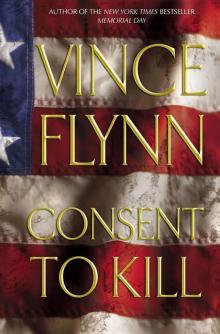 Consent to Kill
Consent to Kill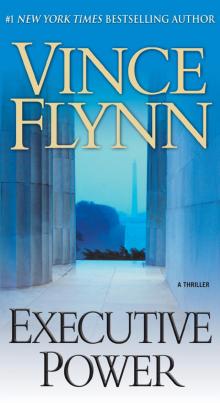 Executive Power
Executive Power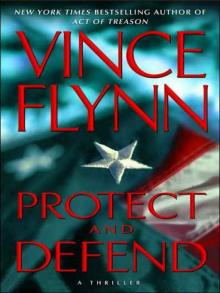 Protect and Defend
Protect and Defend Term Limits
Term Limits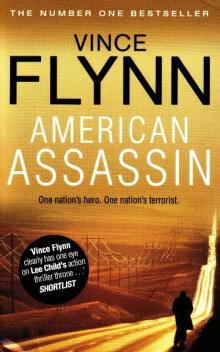 American Assassin
American Assassin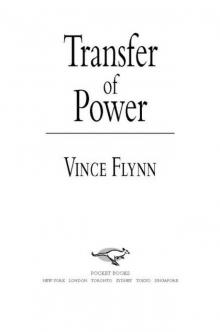 Transfer of Power
Transfer of Power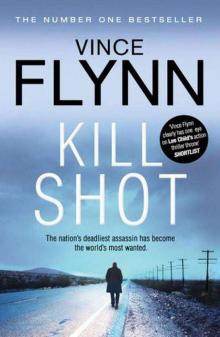 Kill Shot
Kill Shot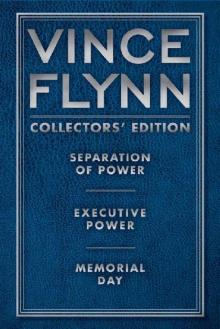 Vince Flynn Collectors' Edition 2
Vince Flynn Collectors' Edition 2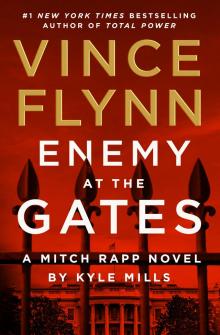 Enemy at the Gates
Enemy at the Gates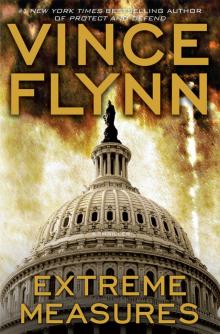 Extreme Measures
Extreme Measures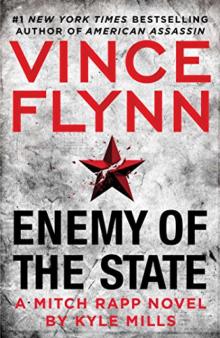 Enemy of the State
Enemy of the State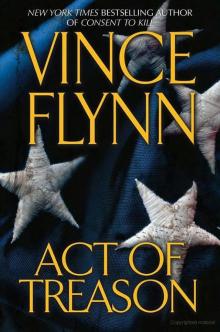 Act of Treason
Act of Treason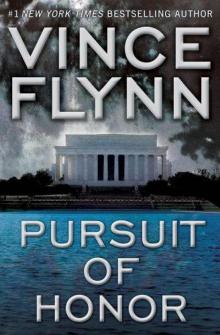 Pursuit of Honor
Pursuit of Honor The Survivor
The Survivor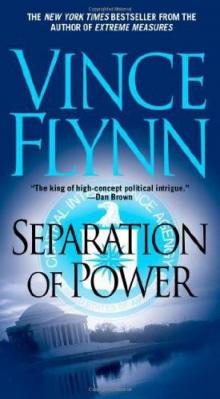 Separation of Power
Separation of Power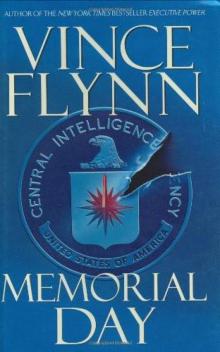 Memorial Day
Memorial Day The Last Man
The Last Man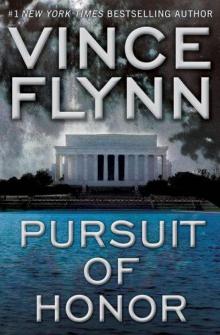 Pursuit of Honor_A Thriller
Pursuit of Honor_A Thriller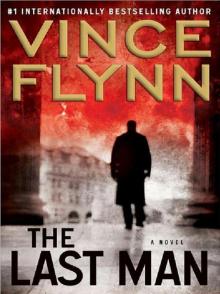 Mitch Rapp 13 - The Last Man
Mitch Rapp 13 - The Last Man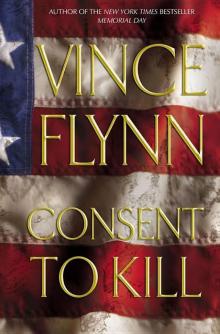 Consent to Kill:
Consent to Kill: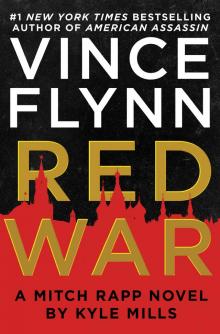 Red War
Red War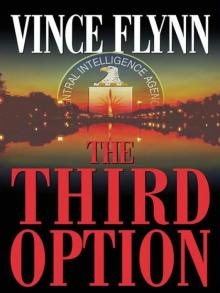 Mitch Rapp 02 - The Third Option
Mitch Rapp 02 - The Third Option Mitch Rapp 05 - Memorial Day
Mitch Rapp 05 - Memorial Day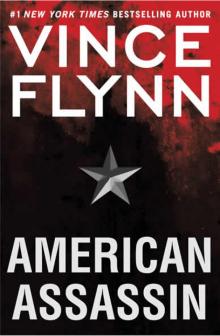 Mitch Rapp 11 - American Assassin
Mitch Rapp 11 - American Assassin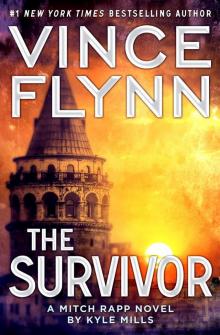 Mitch Rapp 14 - The Survivor
Mitch Rapp 14 - The Survivor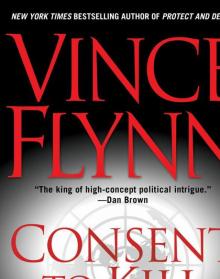 Mitch Rapp 06 - Consent to Kill
Mitch Rapp 06 - Consent to Kill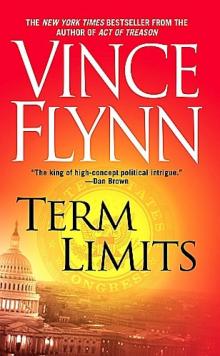 Term Limits mr-1
Term Limits mr-1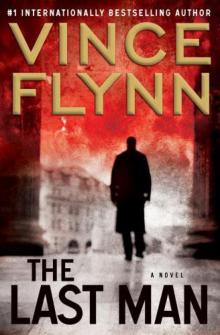 The Last Man mr-13
The Last Man mr-13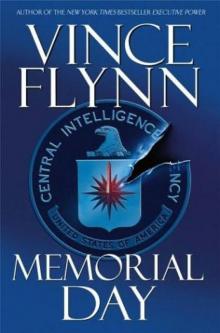 Memorial Day mr-5
Memorial Day mr-5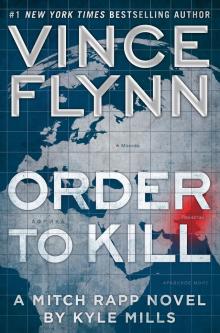 Order to Kill
Order to Kill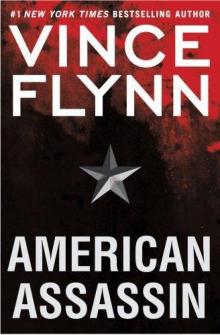 American Assassin: A Thriller
American Assassin: A Thriller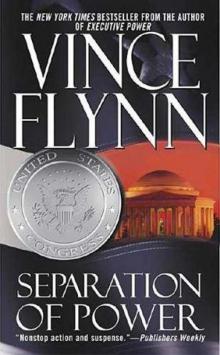 Separation of Power mr-3
Separation of Power mr-3